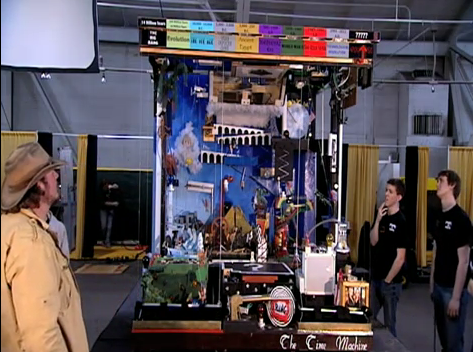I can still remember my first exposure to the fascinating world of Rube Goldberg gadgets: Wallace’s machines in the claymation Wallace and Grommet cartoons. This year, the Purdue Society of Professional Engineers and Society of Hispanic Professional Engineers has created what they believe to be a new world record. The machine utilizes 244 steps chronicling the history of the world, all to accomplish the simple task of watering a flower.
These ingenious devices are named after the late Reuben Goldberg, a WWII-era cartoonist famous for drawing depictions of gadgets that used a series of complex actions and carefully calculated events to achieve a simple task. They’ve enjoyed a prominent place in pop culture, featured in everything from film and television productions to music videos. Famous examples include the inventor’s cookie machine in Edward Scissorhands, Pee-Wee’s breakfast maker in Pee-Wee’s Great Adventure, and, of course, Doc Brown’s device in the opening sequence in Back to the Future. One of my personal favorites is from the video for OK Go’s song, “This Too Shall Pass,” which employs a comparably impressive series of actions, including one mini-scene made entirely of LEGO. It was shot in one continuous take, ending with the band getting sprayed in the face with paint.
Purdue’s device, entitled “Time Machine,” features several vignettes depicting different periods in history. Events such as the Big Bang, the extinction of the dinosaurs, the erection of the pyramids, WWII, and space flight are represented, and a clever take on the predicted 2012 Apocalypse features billowing smoke and red streamers blowing in a fan-driven breeze to simulate fire and destruction.
The team set to work on the machine in October of last year, nearly six months ago, and managed to beat the existing record of 230 steps set last year by Katsumi Takahashi and students at Michigan’s Ferris State University. The team is now awaiting confirmation from Guinness World Records on their claim. If they win, this will be the second time the Purdue team of engineers has held the title for the World Record, having also held the record in 2007.
Source: Popular Mechanics












